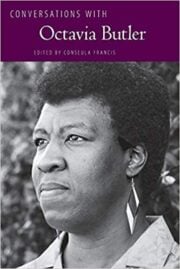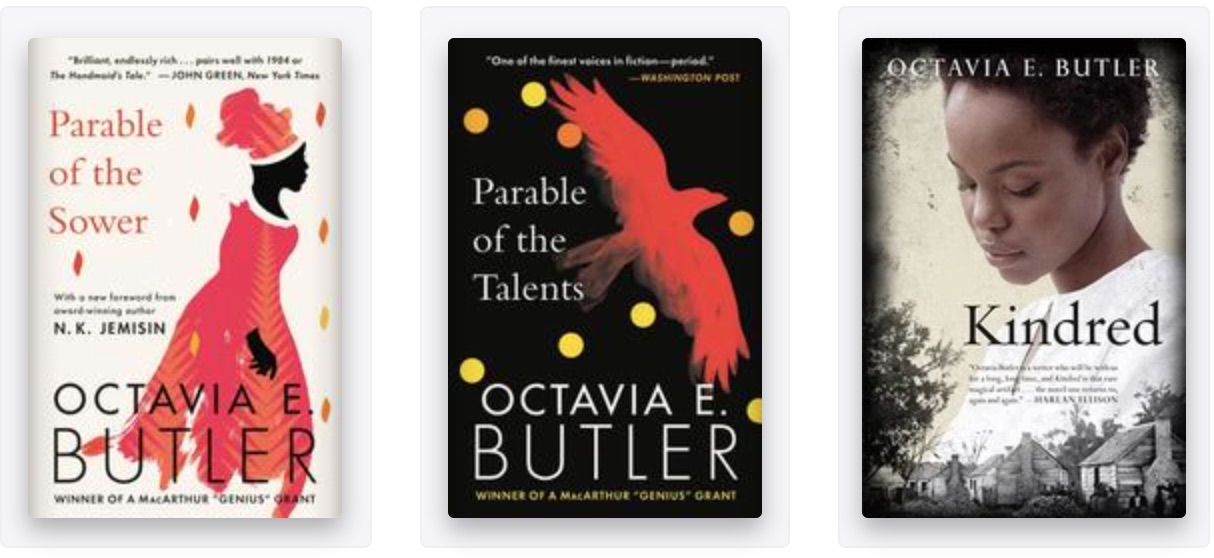Fascinating Facts About Octavia E. Butler
By Aiyana Edmund | On February 28, 2018 | Updated January 12, 2025 | Comments (4)

As a Black woman science fiction writer, Octavia E. Butler (1947 – 2006) blazed a trail when she broke through the then-white male-dominated genre. Here we’ll delve into some fascinating facts about Octavia E. Butler.
In her New York Times obituary, she was described as “an internationally acclaimed science fiction writer whose evocative, often troubling novels explore far-reaching issues of race, sex, power, and ultimately, what it meant to be human.”
It wasn’t easy to break into publishing, but after publishing some short stories, Octavia’s first novel was Patternmaster (1976). It was the first in what would become a four-volume series. Central to these novels are Patternists, people with telepathic powers.
Kindred (1979) was the book that put her on the literary map, though, as more in the genre of speculative fiction than sci-fi, it stood apart from her other works. It tells of a contemporary African-American woman who travels back in time to save an ancestor who happens to be a white slave owner. By saving him in his time, she ensures her own survival in the future.
Other books by Octavia Butler include the Xenogenesis trilogy — Dawn (1987), Adulthood Rites,(1988), and Imago (1989). The two-part Parable series — Parable of the Sower and Parable of the Talents are also among her best-known works.
. . . . . . . . . .
Octavia was raised by her Baptist mother and grandmother
Raised in the racially integrated city of Pasadena, Octavia shared the same name with her mother. She was referred to as “Junior,” which later was shortened to “Junie.” Octavia’s father died when she was seven years old, after which she was raised by her mother and maternal grandmother. She recalled that her upbringing was a very strict form of Baptism. Perhaps that’s why religious fundamentalism is examined with a harsh eye in some of her works such as the Parable and Patternmaster series.
. . . . . . . . . .
She was inspired by a terrible sci-fi film
An avid reader, Octavia was drawn to science fiction magazines like Amazing Stories, whose contents inspired unlimited possibilities and endless flights of imagination. Apparently she also enjoyed bad sci-fi movies (and they were all pretty terrible back then).
Watching the 1945 movie Devil Girl From Mars on television when she was about twelve years old set her mind in motion. From a talk she gave at MIT in 1998, “Devil Girl from Mars: Why I Write Science Fiction”:
“It’s impossible to begin to talk about myself and the media without going back to how I wound up writing science fiction and that is by watching a terrible movie. The movie was called, “Devil Girl from Mars,” and I saw it when I was about l2 years old, and it changed my life.
… As I was watching this film, I had a series of revelations. The first was that “Geez, I can write a better story than that.” And then I thought, “Gee, anybody can write a better story than that.” And my third thought was the clincher: “Somebody got paid for writing that awful story.” So I was off and writing, and a year later I was busy submitting terrible pieces of fiction to innocent magazines.”
. . . . . . . . . .
She was dyslexic and exceedingly tall
Octavia was always exceedingly tall for her age; by the age of fifteen, she reached the height of six feet. She also struggled with dyslexia, which made schoolwork a torture. She began to believe that she was, as she put it, “ugly and stupid, clumsy, and socially hopeless.” Her unusual height made it hard not to stand out, and contributed to her shyness and reserved personality.
. . . . . . . . . .
She supported herself with odd jobs
Octavia would wake at 2 a.m. to write before going to work as a potato chip inspector. She also worked as a dishwasher and telemarketer. She credits many of her odd jobs with providing interesting details for her writing, though she mainly took mindless jobs like these to free her mind for writing.
. . . . . . . . . .
Kindred was inspired by her mother’s work as a domestic
Kindred follows the story of Dana, a contemporary writer who travels back in time to the antebellum south and meets her ancestors, one of whom is the white plantation owner. She is compelled to save his life several times in order to ensure her future existence. Having to blend in with the other enslaved people, she experiences the degradation of this experience over and over in her quest for survival.
Octavia’s mother was a domestic worker. Some of Octavia’s earliest memories were of how poorly her mother was treated by her employers. In an interview with Publishers Weekly, she said, “I didn’t like seeing her go through back doors. If my mother hadn’t put up with all those humiliations, I wouldn’t have eaten very well or lived very comfortably. So I wanted to write a novel that would make others feel the history: the pain and fear that Black people have had to live through in order to endure.”
. . . . . . . . .

Learn more about Octavia E. Butler
(photo courtesy of Wikimedia Commons)
. . . . . . . . . .
She never drove a car
In part due to her dyslexia, Octavia never drove and was a loyal public transportation user. Despite her reserved nature, she was known to start conversations with fellow bus riders.
. . . . . . . . . .
She was awarded a MacArthur “Genius Grant” Fellowship
In 1995, Octavia was awarded the MacaArthur fellowship, becoming was the first science fiction author to win this grant, male or female! She received the $295,000 “Genius” grant and used the freedom it bestowed to completed Parable of the Sower (1993) and Parable of the Talents (1998). She had planned to continue this series, but was beset with writer’s block exacerbated and depression.
. . . . . . . . . .
Octavia Butler Quotes on Writing and Human Nature
. . . . . . . . . .
Friendship with Samuel R. Delany
At the age of twenty-three, Octavia attended the Clarion Science Fiction Workshop, where she was the student of African American sci-fi author Samuel R. Delaney . Shortly thereafter, she entered the field with her first story, “Crossover,” in 1971. The two remained lifelong friends and sometimes spoke at the same events, according to the essay “Science Fiction and Racism” by Delaney.
. . . . . . . . . .
She moved to Seattle with 300 boxes of books
After her mother’s death, Butler relocated to Lake Forest Park, Washington in 1999. According to her obituary in The Guardian she moved 300 boxes of books to her new home. They were part of her growing collection that she was gifted by her mother, who brought home the tattered copies from the homes she cleaned.
. . . . . . . . . .
See also: Octavia Butler’s Best Advice For Beginning Writers
. . . . . . . . . .
She enjoyed traveling to research her novels
Octavia occasionally traveled for pleasure, including her journeys to Peru and hiking Huayna Picchu, the tallest mountain peak in Machu Picchu. But some of these travels were also for the purpose of research. Travels to the Amazon rainforest informed her famed Xenogenesis trilogy.
. . . . . . . . . .
She died of unconfirmed causes
On February 24, 2006, Octavia E. Butler died in her Seattle home at the age of fifty-eight. It’s been noted that she battled with a variety of health issues, such as severe hypertension, but the actual cause of death was never clarified.
. . . . . . . . .
 . . . . . . . . .
. . . . . . . . .
Further reading


Thank you for this article. Butler’s work is thought-provoking, and the themes and issues she explores linger long after the book is closed. It is also hard to real her Parables now without feeling a sense of prescience.
Her voice is an important one to celebrate.
I agree, Kathi, her work is amazing. My favorite is Kindred, which is a standalone in her style, but so powerful. It’s funny you should mention Parables, I started to re-read the first one during the you-know-who administration and found it too eerily prescient, to use the same term you did. Maybe I’ll just move on to Parable of the Talents now!
Octavia Butler was a brilliant writer. I wish that you had started your article with that because that is the most important thing about her writing. It is too bad that she had such a hard life and that she died so young. She had a great talent and I am sure she would have got even better had she lived longer.
Hello Judith, thank you for your comment. Octavia Butler was indeed a brilliant writer. This particular post is intended to highlight lesser known facts about her, one of which is that she was the recipient of the MacArthur “genius” grant. There is a more thorough bio of her on the site, which delves more into her achievements: https://www.literaryladiesguide.com/author-biography/octavia-butler/ I’ll make sure that link is more prominent in this post.